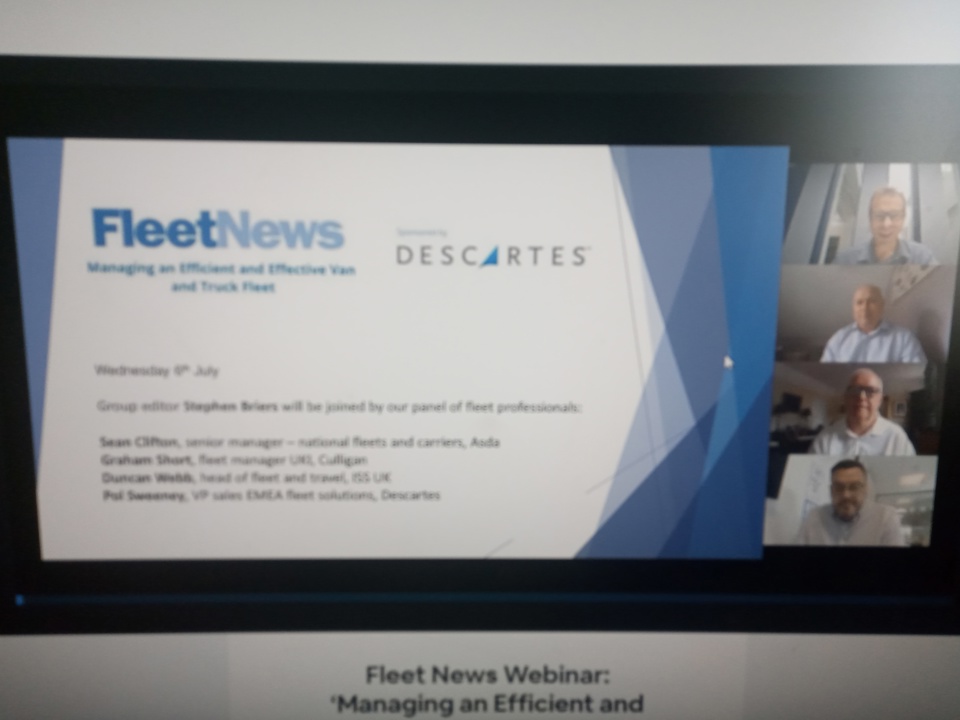Pre-emptive early ordering has helped some fleets to manage the challenge of lengthy supply delays for vans and trucks, as they start to de-fleet ageing vehicles.
Supply issues is one of a number of challenges currently facing operators which were discussed during a Fleet News webinar on ‘managing an efficient and effective van and truck fleet’, sponsored by routing, mobile and telematics provider Descartes.
For some, the ageing fleet is due to retaining vehicles that were stood down during the uncertainties and work reductions created by Covid lockdowns; others needed to keep existing vehicles while expanding their fleets to handle the explosion in demand for home deliveries.
The latter affected Asda. It saw a huge spike in 2020 and 2021 and, while demand has settled down, the business is still running 50% higher than pre-pandemic, achieving its 2027 growth targets five years early.
“In the early days of massive growth, we held onto vehicles longer – in some cases plus 12m, which was challenging,” Sean Clifton, senior manager, national fleets at Asda, told webinar viewers.
“The vehicles are very well used so there were some uptime challenges to manage. Where we are now is much more in control, with early ordering compensating mostly for automotive supply chain issues.”
Home delivery is now the norm for most households in the UK and it’s now down to fleet operators to keep up with some “brilliant” innovations, according to Duncan Webb, head of fleet, UK & Ireland at ISS.
Drawing on his previous experiences at Royal Mail and BT, he said: “Complexity for fleet managers has gone through the roof. And it’s not all owned asset delivered, so grey fleet management has never been more essential, whether they are delivering on a bike, a trike, a small van or a big car. You need to have the basics of the grey fleet management principles embedded, such as tax, insurance, MOT, maybe NCAP safety rating.”
Webb added: “The biggest challenge is the asset types we are now using to deliver this service, from an electric vehicle to a push bike with a box on the back – different requirements for different markets. The fleet manager should have the jurisdiction and the policy over all, irrespective of the asset type.”
Pol Sweeney, VP sales EMEA fleet solutions, at webinar sponsor Descartes also pointed to the mixed channels for delivery, whether grey fleet, gig economy or outsourced. Management of channel to maximise the utilisation is key for any business.
“We are seeing organisations looking for higher levels of utilisation, in terms of delivery and higher density routes and getting appointments out of customers based on ability to utilise the density of those routes,” he said.
“In the food service industry, they are using their fleets for delivery and collection for back filling. Organisations are beginning to take advantage of that.”
Driver training is playing an ever more important role within UK business, with customer service weaved into the core safety behaviour and efficiency learning.
“Drivers have always been our customer-facing colleague so representing the brand was always a big part of their training,” Clifton said. “Some of our more recent developments are ‘Rate my Driver’ for in-the-moment feedback and resolving issues at the doorstep.
Part of the driving induction at Culligan UKI is to instil the culture that the van can be “either the best or the worst advert for our business”, said fleet manager Graham Short.
“A clean van, driven well, can be a great advert. But social media can be very powerful with videos of poor driving,” he said. “On the van check app, I ask the drivers to take a picture of their van at least once a week so we can see it’s been cleaned on a regular basis. We also track driver behaviour and reward good behaviour.”
Driver shortages remain a pressing concern for businesses, whether vocational drivers or tradespeople.
“This remains a key challenge in our sector – competition for drivers has never been so high,” Clifton said. “Pay has been reviewed and there are other benefits of joining Asda that are stressed as part of adverts. We have colleagues in store who are trained to back-fill some roles and this is the case for drivers as well. We also use agency drivers where practical.”
Website panellists:
- Sean Clifton, senior manager, national fleets at Asda
- Graham Short, Culligan UKI fleet manager
- Duncan Webb, head of fleet, UK & Ireland at ISS
- Pol Sweeney, VP sales EMEA fleet solutions, Descartes





















Login to comment
Comments
No comments have been made yet.